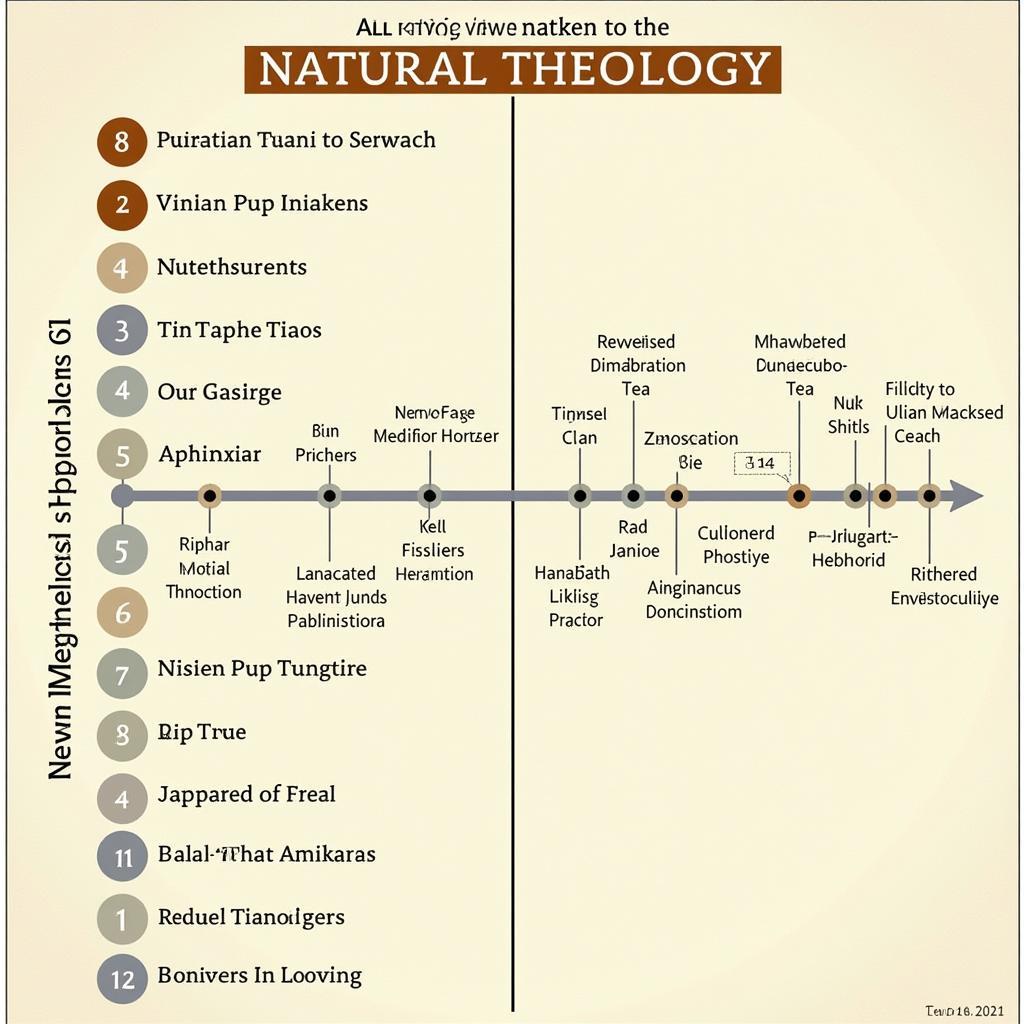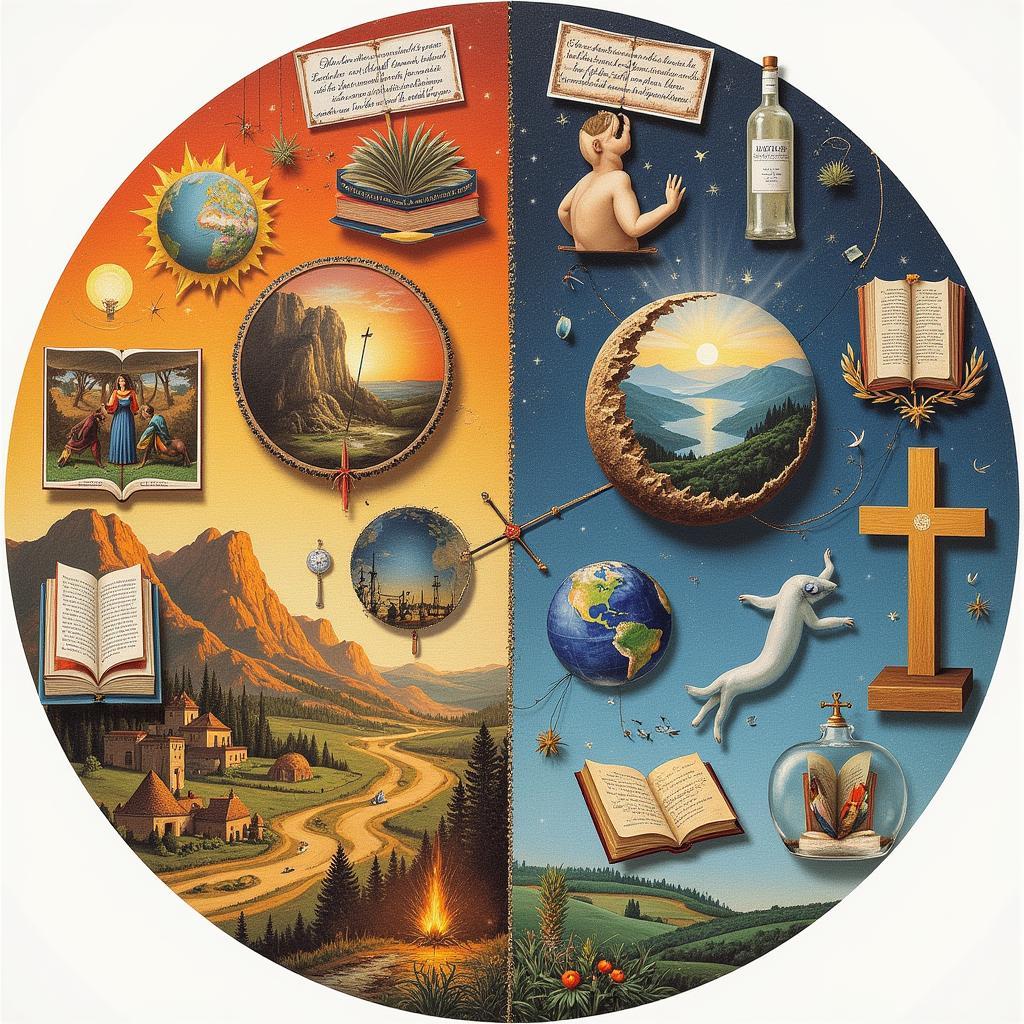Revealed theology and natural theology represent two distinct approaches to understanding God. This article delves into the core differences and similarities between these two theological perspectives, exploring their historical development, key arguments, and implications for faith and reason.
Understanding the Core Concepts
Natural theology seeks to understand God through reason and observation of the natural world. It proposes that God’s existence and certain attributes can be known without relying on divine revelation. Conversely, revealed theology emphasizes God’s self-disclosure through specific historical events, sacred texts, and religious experiences, like those found in the Bible or the Quran. It argues that true knowledge of God comes primarily through these divinely initiated communications.
 So sánh Thần học Mặc khải và Thần học Tự nhiên
So sánh Thần học Mặc khải và Thần học Tự nhiên
Key Differences Between Revealed and Natural Theology
- Source of Knowledge: Natural theology relies on human reason and empirical evidence, while revealed theology relies on divine communication and sacred texts.
- Scope of Knowledge: Natural theology aims to prove God’s existence and some of His attributes. Revealed theology offers a more comprehensive understanding of God, including His nature, will, and plan for humanity.
- Role of Faith: In natural theology, faith can be a consequence of reason. In revealed theology, faith is often a prerequisite for understanding divine revelation.
Historical Development of Revealed and Natural Theology
The roots of natural theology can be traced back to ancient Greek philosophers like Plato and Aristotle. They used reason to argue for the existence of a Prime Mover or an Unmoved Mover. In the Middle Ages, theologians like Thomas Aquinas integrated Aristotelian philosophy with Christian doctrine, further developing natural theology.
 Sự phát triển lịch sử của Thần học Mặc khải và Thần học Tự nhiên
Sự phát triển lịch sử của Thần học Mặc khải và Thần học Tự nhiên
Revealed theology, on the other hand, finds its foundation in the sacred texts and traditions of various religions. Abraham, Moses, and Jesus are considered key figures in the development of revealed theology in Judaism and Christianity. Muhammad is the central figure in the development of revealed theology in Islam.
The Interplay Between Reason and Revelation
The relationship between revealed and natural theology has been a subject of ongoing debate. Some argue that they are complementary, with reason supporting and clarifying revelation. Others maintain that revelation supersedes reason, providing truths that are inaccessible through human intellect alone.
Examples of Revealed and Natural Theology in Practice
Natural theology can be observed in arguments for God’s existence based on the design of the universe or the moral law. The teleological argument, for example, posits that the complexity and order of the universe suggest an intelligent designer.
Revealed theology is evident in doctrines such as the Trinity (Christianity) or the concept of Tawhid (Islam). These concepts are not readily accessible through natural observation but are revealed through sacred texts and religious experiences.
 Ví dụ về Thần học Mặc khải và Thần học Tự nhiên
Ví dụ về Thần học Mặc khải và Thần học Tự nhiên
Conclusion: Finding Harmony Between Two Perspectives
Revealed theology and natural theology offer different paths towards understanding God. While they may appear distinct, they can also complement each other. By exploring both perspectives, individuals can develop a more nuanced and comprehensive understanding of the divine. Understanding both revealed theology and natural theology provides a richer perspective on the complex relationship between faith and reason.
FAQ: Frequently Asked Questions about Revealed and Natural Theology
-
Can natural theology lead to faith? While natural theology can provide evidence for God’s existence, it doesn’t necessarily lead to personal faith, which often involves a deeper commitment and trust.
-
Is revealed theology always based on scripture? While scripture is a primary source for revealed theology, it can also encompass other forms of divine communication, such as mystical experiences or prophetic visions.
-
Can science and revealed theology coexist? Many people find no conflict between scientific understanding and revealed theology, viewing them as addressing different aspects of reality.
-
What is the role of interpretation in revealed theology? Interpretation plays a crucial role in understanding revealed texts and applying their teachings to contemporary contexts.
-
Is natural theology universally accepted? No, natural theology has been subject to criticism, particularly regarding the strength and validity of its arguments.
Other Related Topics You Might Find Interesting:
- Philosophy of Religion
- Comparative Religion
- History of Christian Thought
- Islamic Theology
Need further assistance? Contact us! Phone: 02838172459, Email: truyenthongbongda@gmail.com. Visit us at 596 Đ. Hậu Giang, P.12, Quận 6, Hồ Chí Minh 70000, Việt Nam. We have a 24/7 customer support team.